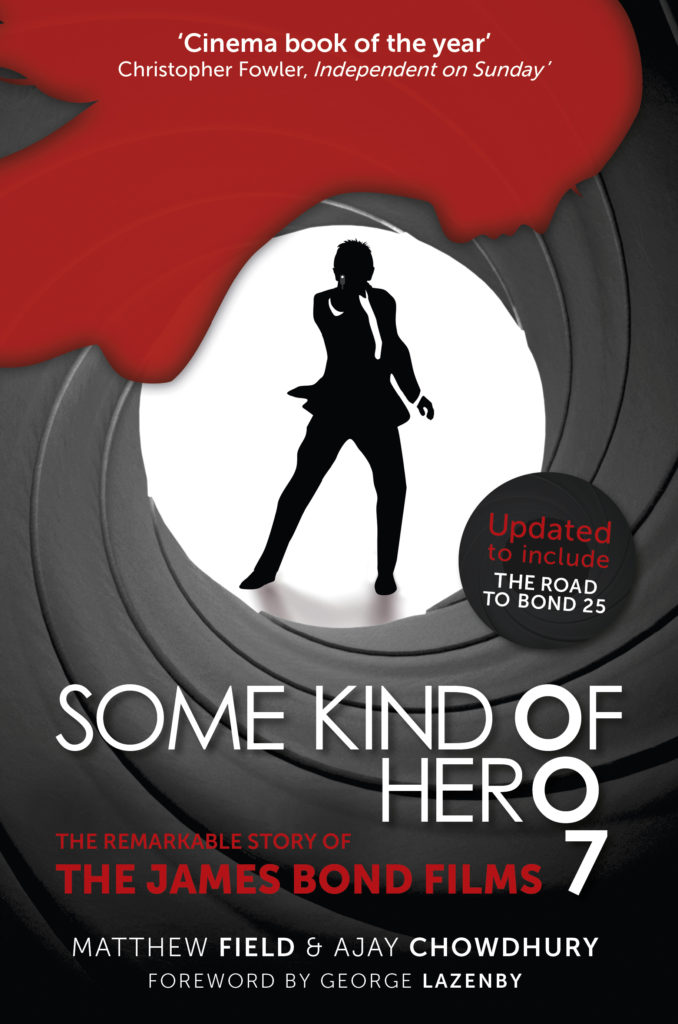
Tag: Matthew Field
 Two good fellow bullet catchers are to bring out a great new 007 tome in December 2015.
Two good fellow bullet catchers are to bring out a great new 007 tome in December 2015.
Some Kind Of Hero – The Remarkable Story of the James Bond Films is a new, exhaustive account of the production of the 007 movies and is written by Ajay Chowdhury and Matthew Field.
“We have gained a new appreciation of not only how the series was started but how that Rolls-Royce standard has been maintained” – Field & Chowdhury
“For over 50 years, Albert R. Broccoli’s Eon Productions has navigated the ups and downs of the volatile British film industry, enduring both critical wrath and acclaim in equal measure for its now legendary James Bond series. Latterly, this family-run business has been crowned with box office gold and recognized by motion picture academies around the world. However, it has not always been smooth sailing. Changing tax regimes forced 007 to relocate to France and Mexico; changing fashions and politics led to box office disappointments; and changing studio regimes and business disputes all but killed the franchise while the rise of competing action heroes displaced Bond’s place in popular culture. But against all odds the filmmakers continue to wring new life from the series, and 2012’s Skyfall saw both huge critical and commercial success, crowning 007 as the undisputed king of the action genre.”
Some Kind of Hero recounts this remarkable story, from its origins in the early 1960s right through to the present day, and draws on hundreds of unpublished interviews with the cast and crew of this iconic series.
Authors Field and Chowdhury commented: ‘As we delved deeper into the Bond mythos, we realised there were many untold tales from many unsung heroes who played key creative roles in the series. We hope that even the most devoted Bond fans will find fascinating facets to the franchise in these pages. We have gained a new appreciation of not only how the series was started but how that Rolls-Royce standard has been maintained. When SPECTRE is released later this year, we hope readers will gain some insight in yet another chapter in the remarkable story of the James Bond films.’
About the authors :
Matthew Field is a film journalist with CINEMA RETRO magazine and an author, whose books include THE MAKING OF THE ITALIAN JOB and MICHAEL CAINE – YOU’RE A BIG MAN. He was also a consultant on the acclaimed James Bond documentary EVERYTHING OR NOTHING.
Ajay Chowdhury is an attorney and has given legal consultation on motion picture, music, publishing, television, and theatrical projects. He was the associate producer on two feature films and has contributed to numerous books on James Bond including GOLDENEYE – WHERE BOND WAS BORN : IAN FLEMING’S JAMAICA.
Some Kind Of Hero – The Remarkable Story of the James Bond Films
by Matthew Field & Ajay Chowdhury
Published by The History Press
December 5th 2015
 Robert De Niro clambering silently after deer in a Pittsburgh dawn, Joanna Cassidy cascading recklessly through a neon-soaked 2019 Los Angeles, Donald Sutherland and Julie Christie both clambering and cascading in one of cinema’s greatest sex scenes, a low-shot 1969 Michael Caine in any number of his modish suits and ties, Christopher Lee in folk-drag on a Scottish isle and Ali McGraw’s 1978 fro …. these are all moments of cinema which emerged under the watchful eye of British producer Michael Deeley.
Robert De Niro clambering silently after deer in a Pittsburgh dawn, Joanna Cassidy cascading recklessly through a neon-soaked 2019 Los Angeles, Donald Sutherland and Julie Christie both clambering and cascading in one of cinema’s greatest sex scenes, a low-shot 1969 Michael Caine in any number of his modish suits and ties, Christopher Lee in folk-drag on a Scottish isle and Ali McGraw’s 1978 fro …. these are all moments of cinema which emerged under the watchful eye of British producer Michael Deeley.
Under the banner of Films Mean Business and their networking initiatives, seminars, screenings and socials Deeley attended a Q&A in London this week. Expertly steered by writer and film PR man Matthew Field (who co-wrote Deeley’s 2009 own book, Blade Runners, Deer Hunters and Blowing the Bloody Doors Off: My Life in Cult Movies) the session quickly becomes a fascinating and honest trawl through one man’s deer hunting, blade running, eleventh hour visitations from Warren Beatty (he wanted the sex scene in Don’t Look Now cut to spare the blushes of his then partner Julie Christie – Deeley rightfully refused, citing that was vital to the narrative), daily creative negotiations with a vice-addled Sam Peckinpah on Convoy (Peckinpah was not best pleased he was directing “a trucker movie”) and taking endless blame for allegedly not championing the first wave release of The Wicker Man (Deeley and Christopher Lee will forever beg to differ on what happened there – but, as the former points out more than once, a producer has to get a movie sold, seen and paid for, which is not always on the radar of actors).
Of course Deeley recounts his times producing 1969’s The Italian Job for Paramount Pictures. He recalls an original take on Troy Kennedy Martin’s [then] rather humourless script needing a desperate added layer of caper (a lightness of touch this writer thanked him for as there is nowt wrong with Peter Collinson’s timeless mod-yssey). Deeley was eventually able to cast the deliberately quirky likes of Benny Hill and Noel Coward and the rest is Britpop, Mini Cooper and cinema history. Deeley also rather deliciously teases out exactly what Croker’s cliff-hanger idea* is. And when asked if he made any money from the 2003 The Italian Job remake, Deeley is deliciously quick to fire, “no, and neither did Paramount“.
Whilst I don’t fully agree with Deeley and his 1978 producer hat that suggests the first 45 minutes of Michael Cimino’s three hour The Deer Hunter (1978) is surplus to requirements because it impinges on the daily tally of screenings and hence profit (I believe that Pittsburgh first act sets up the characters and their American world that few other Vietnam movies took the time and dignity to do), Deeley seems particularly proud of the Oscar winning classic (and the fact John Wayne presented him with Best Picture three weeks before life’s Russian roulette took the cowboy star from this world). I asked Deeley what his proudest scene or shot is, what was the defining moment. He quipped that it is Benny Hill’s penchant for “big” ladies in The Italian Job (“I like ’em big!“) but conceded that it is the Russian Roulette scene in Hunter with its sharp, acute and panicky intensity.
And then so to Blade Runner. Matthew Field was astute to not labour any of the special edition anecdotes we all think we know about the likes of 1982’s sci-fi turning point. It is the film Deeley seems most proud of, despite its “Hollywood star” increasingly miffed he was not getting regular on-set “cuddles” from Ridley Scott and the physical difficulties of shooting at night and in the rain for months on end. Deeley personally believes Scott is “stupid” to embark upon Blade Runner 2 – which French-Canadian director Denis Villeneuve (Prisoners, Enemy) is currently circled to direct. Less the narrow vision of an older producer looking back, this writer believes the calmly savvy and non-cynical Deeley is on to something here. He mentions the models, rostrums and pioneering (hence, unknown) effects processes and experiments of the original Blade Runner with great reverence. I wonder just how that very real, very physical world of 1982’s 2019 would translate to today’s CGI, rendering and virtual sets. Nostalgia for one of the benchmarks of sci-fi cinema is not enough reason to go back.
And it is the myths surrounding how films happen which Deeley is particularly adept at shattering. When asked “what exactly does a producer do?” by an astute questioner in the audience no doubt keen to get the room of fledgling producers and creatives to peer around the rose-tinted prism of cinema’s best and hardest job, Deeley’s simple and telling response was, “he causes the film to happen“.
Michael Deeley is certainly testament to the best causes and effects of cinema.
With thanks to Michael Deeley, Matthew Field and Ajay Chowdhury.
Blade Runners, Deer Hunters & Blowing the Bloody Doors Off: My Life in Cult Movies by Michael Deeley (with Matthew Field) is available now in paperback from Pegasus Books.
Blade Runner – The Final Cut will be released at selected cinema on April 3rd 2015 in association with the BFI.
[* As Croker and the boys lie in paused terror the roar of a helicopter is accompanied by the sight of two steel cables descending to hoist the coach back onto the road as the gold plays back into the mafia’s hands and hence The Self Preservation Society (come on, it’s a great title!) has its narrative starter pistol]





